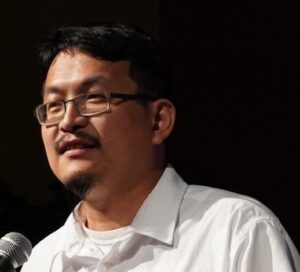James is a bright young Chinese man raised in a communist family. He decides to study abroad to see the world. Landing in the US, he is invited to attend a campus Bible study group. Like other young Chinese atheists, he asks many difficult questions and challenges the Christian faith. The questions are not always adequately answered, but he is impressed by the genuine love shown to him by those Christians. At an evangelistic rally, the Holy Spirit opens up his mind to see the beauty of the gospel, and he prays to receive Christ as his personal savior.
James quickly becomes a lay leader in the church and meets his future spouse who was raised in an anti-communist family hurt by the Party’s past. They both graduate from the university and get married the same year. Unsure of their next step, they strive to build a Christ-centered family. James finds a research assistant position at another university, and the couple moves to a new state. The funding is not secure, so they must relocate once more. They join a new church there and are recruited to start a new student ministry.
The couple are discipled, mentored, and learn varied Christian disciplines from many teachers with different spiritual backgrounds at multiple locations. They often consider returning to China, as they desire to share the gospel with their families, but they believe their children have better opportunities in the US. A few years later, James joins another university and serves as an adjunct professor. They move again, knowing it will not be their last relocation.
James and his family are an example of the highly mobile generation of Chinese intellectuals we are encountering. They undertake various life stages across multiple locales and manage a complex blend of worldviews derived from diverse perspectives. They experience personal growth through adaptation to new roles and environments and make significant impacts on communities beyond their immediate circle.
This phenomenon became more significant during the pandemic when everyone retreated from in-person gatherings and increased engagement online. The direct impact on the lives of local churches was tremendous. However, the thriving virtual communities of varied interests were impressive. It has become imperative for Christian leaders to rethink the role of the local church, parachurch, and the use of digital platforms and media.
Ambassadors for Christ (AFC), Inc. is a missionary organization established in 1963 and headquartered in Paradise, Pennsylvania. Its vision is to equip and mobilize Chinese American churches to reach out to Chinese-speaking young intellectuals for evangelism, discipleship, and leadership transformation. During the pandemic, the organization adopted an innovative ministry model that focuses on supporting micro-communities, which reflect the highly mobile character of overseas Chinese intellectuals. These groups differ from traditional small groups because they do not have inherent “DNA” since they do not necessarily have reproducible training models. Each micro-community exists to serve actual needs. Collectively, these micro-communities embody the ecosystem of the gospel—the variety of Christian life and the diversity of people groups.
AFC also established the United Student Outreach (USO). The USO is a platform of micro-communities that brings together churches and parachurch ministries through a membership management system to collaborate and reach the highly mobile generation of Chinese international students, young professionals, young families, and returnees. AFC assigns full-time staff to form a team that is involved in creating and developing the micro-communities on the platform.
This ministry model leads to a different method of digital engagement. First, it does not emphasize promoting organizational resources to an unknown audience. Instead, it works with micro-communities first and then uses digital engagement to promote the sharing of resources that reflect the diversity of the ecosystem. Second, it does not rely on the user’s loyalty to a particular program. As long as the user maintains a connection with the platform, it integrates a variety of resources to suit the user’s needs, adapting to the user’s constantly changing location and life stage.
This method also has better potential for building in-depth relationships. The membership system allows us to see many aspects of a person who may have different interests and experiences during different life stages while staying abroad. One-on-one mentoring can occur simultaneously as the person participates in various short-term programs. Opportunities for personal growth can arise from both online and on-site activities.
In short, digital engagement is not just another way of using media in a more interactive manner. Digital engagement is also an integral part of the life of the multifaceted Christian life in communities.

Tsun-En Lu
Tsun-En Lu is the director of Discipleship Resource Center at Ambassadors for Christ, Inc. The organization equips and mobilizes Chinese immigrant churches to reach Chinese-speaking young intellectuals in North America. Tsun-En and his team are responsible for providing comprehensive, strategic, integrated, and accessible resources. They adopt a membership management strategy for micro-communities of …View Full Bio